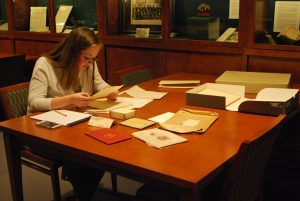by Meghan O’Donnell ’18
In September #TeamPeirs celebrated our two-year anniversary of going live. As anniversaries are a time for reflection, we thought we would contribute a few pieces on what #TheStaff has taken away from working on Peirs. As we are in the midst of a crowdfunding campaign to get us over to France in March 2018, we thought it might be of interest to our readers to know what its like to work on this project.
In my first two years of studying history at Gettysburg College, I had buried my head in books and scholarly articles that attempted to reconstruct the past. I learned about history primarily through the words of other academics. My experience with archival materials was limited; the methods course I had taken was the only time that I had ever really spent time rifling through the materials in Special Collections. I was a student of history – my understanding of it as abstract as that phrase – but not a historian.

Peirs Project Intern, Meghan O’Donnell ’18, examines additions to the Peirs Papers in Special Collections & College Archives, Musselman Library, 2017.
When I joined The Peirs Project in my junior year, however, I was finally able to do history, not just study it. Jack’s letters, though seemingly frozen in time, give us the opportunity to continuously nuance our interpretation of the First World War. In many ways, Jack fits the narrative that historians have established over time. But because we have the ability to study his own words, we are also able to treat him as an individual actor in climactic historical events as opposed to a victim of circumstances beyond his control. We have in Jack a man whose incredibly cynical sense of humor, boyish fascination with airplanes, tanks, and cars, and love of the material comforts of his upper-middle-class world are as integral to his personality as his commitment to his patriotic duty and leadership skills are. He was a war hero, but he was also a finicky and funny man who had a tendency to refer to his men as his “lambs” and his nieces as “the infants.”
There are so many things about Jack that I admire: he loved his family, and when he wrote to them of his combat experiences, he was honest, but tight-lipped, careful never to upset them. He knew how to lead and how to get things done. He was thoughtful and he was an exemplary soldier. He was brave. There are also things about Jack that I do not necessarily admire. He never could see past his own experience as an upper-middle-class white man, volunteering, for example, to help put down the 1926 General Strike in Great Britain. He believed in the class system.
Jack’s complexity is a continual reminder to me that I cannot generalize, sugarcoat, or demonize the past. As a historian, I have a responsibility to acknowledge its complexity. The past was not just a conglomerate of violent conflicts and statistics and laws. The past was human.
Jack’s letters have been incredibly valuable to my formation as a historian. But they have also been valuable to me personally. There are scholars in the field of history, much more intelligent and accomplished than I, who believe firmly in maintaining an emotional distance from the past. Perhaps they are right. I would be lying, though, if I said that I haven’t laughed out loud while reading Jack’s letters or been brought to tears by them. Though I can never truly know Jack, the bits of his life that we have been able to reconstruct remind me that the past is still very much a part of our present.
It is a privilege to work on this project and help others get to know Jack. Reading his letters has been a transformative, disturbing, humbling, and inspiring experience for me, and it is thrilling to bring them to the public so that others can discover Jack and follow his journey.
I will be forever grateful for the opportunity to study these letters and the man who wrote them.
